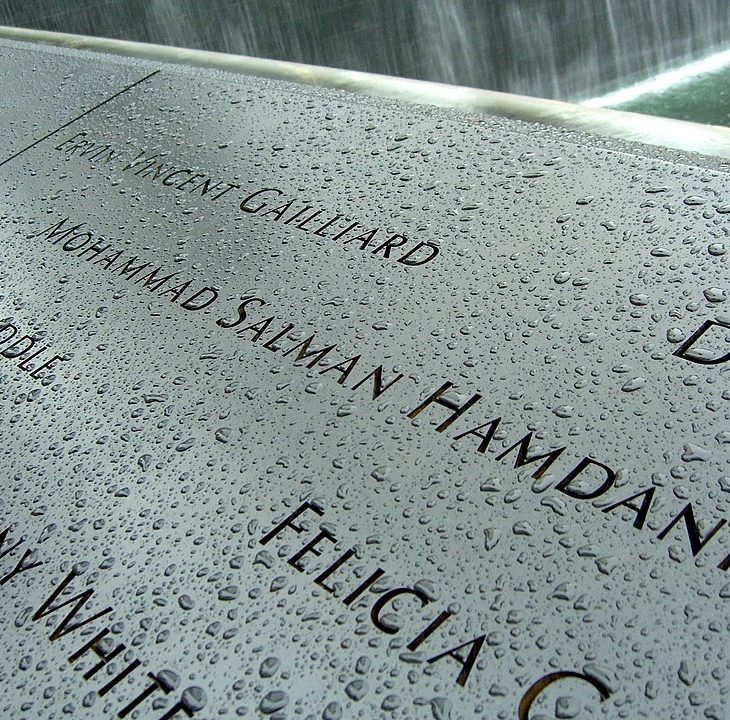9/11, America, and Our Future
September 10, 2020

Mohammad Salman Hamdani, a 23-year-old Muslim American New Yorker born in Pakistan, disappeared with thousands of others on September 11, 2001. He had been on his way to work at a DNA analysis lab at Rockefeller University. Mohammad was a police cadet, a certified medical technician, and a volunteer for an ambulance service. None of that seemed to matter to the authorities after 9/11. They viewed him principally as a suspect. As his family searched frantically for Salman, the police were circulating fliers with his picture that said, “Hold and detain. Notify major case squad.”
For six harrowing months, a cloud of suspicion hung over Mohammad’s reputation, intensifying his family’s grief. It wasn’t until March 2002 that his name was cleared. It turns out that Mohammad Salman Hamdani, upon seeing the planes hit the World Trade Center, had run towards the disaster, hoping to help his fellow Americans. His body was found in the wreckage near the remains of other first responders.
Several officials acknowledged Salman in public ways, including Representative Keith Ellison and New York City Police Chief Raymond Kelly. He was buried in a New York Police Department ceremony.
Share
Related Articles
American Civic Life
We Commemorate, We Commit: Out of Catastrophe, a Conversation on Connection and Repair
American Civic Life
Higher Education
Mayor Michael Bloomberg spoke of him with awe, saying, “Salman stood up when most people would have gone in the other direction.”
Mayor Michael Bloomberg spoke of him with awe, saying, “Salman stood up when most people would have gone in the other direction.”
But Mohammad Salman Hamdani has been denied some of the recognition that many thinks should be his due, given the combination of heroic sacrifice and prejudice-driven suspicion. The most important slight is not being included as one of the fallen first responders on the National September 11 Memorial.
His mother believes it is because of his first name. “They don’t want someone with the name Mohammad to be up there.”Otterman, Sharon. “Obscuring a Muslim Name, and an American’s Sacrifice.” The New York Times . January 1, 2012.
Who would not sympathize with Mrs. Hamdani after all that she has been through? And who would not understand, by extension, the pain of Muslims in America, the pain of feeling that your names will never be honored by your nation.
And yet, the idea that America would never give full honors to a man named Muhammad is not actually entirely true.
In 1966, a championship boxer once known as Cassius Clay claimed that his adopted religion, Islam, forbade him from fighting in America’s war in Vietnam. After winning a boxing match by knockout in the seventh round, the man who had taken the name Muhammad Ali told television cameras, “My conscience won’t let me go shoot my brother, or some darker people, or some poor hungry people in the mud for big powerful America.”
A year later, in Houston, Ali formally refused to be inducted into the armed services. He was convicted of a felony, stripped of his boxing license, fined, and sentenced to jail.
At the time, the vast majority of the American public reviled Ali for his position. Certainly, his Muslim name contributed to their loathing. The American television host David Susskind called Ali a disgrace to his country, his race, and his profession. Even Jackie Robinson criticized him.
The law of the land, the Supreme Court, stood up for Ali. They vacated the decision of the lower court, paving the way for Ali to start boxing widely again. The Court took seriously his faith-based conscientious objector claim, which means they took seriously his faith. Calamur, Krishnadev. “Muhammad Ali and Vietnam.” The Atlantic. June 4, 2016.
It took time, but America ultimately stood up for Ali. By the time he returned to the spotlight and the ring, Ali had lost three prime years of his boxing career, but his personality was just as large and joyous. He argued with reporters, he cracked jokes at press conferences, he provoked challenges, oftentimes in rhyme. He won boxing matches and lost some as well. Along the way, he became a beloved icon, in this country and beyond. The BBC named Ali the Sports Personality of the Century.
Perhaps most poignantly, he was selected to light the Olympic Cauldron at the Centennial Games in Atlanta in 1996. Remarkably, the moment had been kept a secret from the world. Even the athletes who were participating in the Opening Ceremony did not know that Muhammad Ali had been given the ultimate honor.
Let us remember how the scene unfolded. Here is Janet Evans, the great swimmer, running the torch up the ramp. She does not know who will take it from her hands. As if by magic, the Champ appears on the Olympic Stage. He takes the flame and stands there for a moment, holding the Torch high. The announcers almost do not know what to say, the cameras flash and flash, the applause of the stadium is thunderous. And there is Ali, his body shaking with Parkinson’s disease, his face glowing, receiving the acclaim of a nation that once viewed him as a traitor and refused to call him by his Muslim name. Boren, Cindy. “The iconic moment Muhammad Ali lit the Olympic flame in Atlanta almost didn’t happen.” The Washington Post. June 4, 2016.
It is precisely the full-circle quality of the story that makes this a civil religious moment for American Muslims.
When Muhammad Ali died in early June 2016, he was given what can only be described as a state funeral. The ceremony was carried live on both news and sports channels. Celebrities and senior officials made statements or were present in person. Several commented on Ali’s Muslim faith and the role it played in his refusal to fight in Vietnam. Attorney General Eric Holder said, “His biggest win came not in the ring but in our courts in his fight for his beliefs.”
President Obama spoke of Ali’s conviction and its influence on the nation: “It would earn him enemies on the left and the right, make him reviled, and nearly send him to jail. But Ali stood his ground. And his victory helped us get used to America we recognize today.”
My favorite story at Ali’s funeral was told by the comedian Billy Crystal.
Once, when Billy Crystal was visiting Ali’s home town of Louisville, the boxer invited the comedian to join him on a run at the country club where he exercised. Crystal had to decline. Why not, Ali demanded to know. Afraid you can’t keep up with the Champ? The real answer was far more depressing. The country club did not admit Jews.
Ali was incensed. Racism and religious bigotry enraged him no matter who was being targeted. He declared that he would never set foot in that country club again.
Ali was incensed. Racism and religious bigotry enraged him no matter who was being targeted. He declared that he would never set foot in that country club again.
That was, in part at least, Ali’s Muslim conviction speaking. Just as his Muslim faith moved him to stand his ground on the Vietnam War, so it moved him to stand up for a Jew in Louisville.
People change America, people with all kinds of faiths and names, including the name Muhammad.
During these early September days, 19 years after the horror of the terrorist attacks of 9/11/01 that took so many lives, I join our nation and pause to remember all who lost their lives and stand with all who continue to mourn, and commit myself to build a world where terrorism and bigotry have no quarter in our hearts or in our land.



